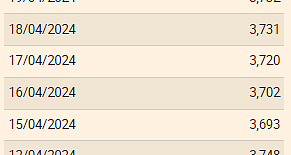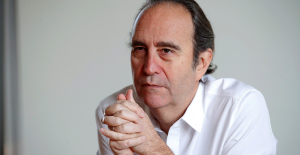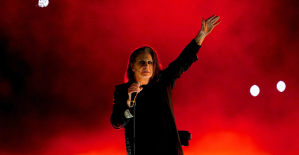Surrounded by the new management team - six men all dressed in matching navy blue windbreakers - the 69-year-old president has been in recent days in Yan'an (north), considered the cradle of the Chinese Communist Party ( CCP).
Analysts believe that this choice portends what the next five years in power of Xi Jinping could look like.
"The visit to Yan'an served to mark the parallel (with Mao) and the absence of opposition," said sinologist Manoj Kewalramani, of the Takshashila Institute in Bengaluru, India.
Xi Jinping has concentrated and personalized power more than any leader since Mao Tse-tung (1949-1976). And the strong man from Beijing won an unprecedented third term as head of the CCP on October 23.
The new Standing Committee of the party, which represents the heart of power in China, is now composed only of its allies, six men.
In the state television news CCTV, a 16-minute report on the visit to Yan'an was embellished with several portraits of Mao.
Among the highlights of this trip: a visit to the former residence of Mao and the place where a crucial meeting of the CCP was held in 1945 which confirmed him as party chairman.
At that time, the political formation was facing a bloody civil war.
"One of the signals that Xi seems to be sending (...) is to prepare for difficult times and for the fight," said sinologist Bill Bishop in his specialized newsletter on China, Sinocism.
- "Yan'an period" -
In 2012, the leader took his new team to attend an exhibition on the rebirth of the Chinese nation in Beijing. In 2017, they visited the very place where the first CCP congress was held in 1921, in a school in Shanghai.
"The first trips after each party congress are intended to recall the original mission," said political scientist Wen-Ti Sung of the Australian National University.
According to state media, Xi Jinping assured last Thursday that his new standing committee would "inherit and continue the fine revolutionary traditions formed by the party during the Yan'an period".
Nestled in the arid and remote mountains of northern China, Yan'an is a sacred place for the CCP.
This is where party members dug in after the Long March, a grueling cross-country trek on foot from 1934 to 1935 to escape Nationalist troops during the Civil War.
Only a handful of survivors made it to Yan'an. Mao and his allies - including Xi Jinping's father - lived among peasants in basements while they prepared for their military campaign.
Since their victory, the "Yan'an period" has been celebrated in the party as a perfect example of its ability to withstand adversity.
- "Heir to the revolution" -
Yan'an's name is also closely related to Mao.
More than 10,000 people, including intellectuals and artists, have been killed in a purge campaign known as the "Rectification of Yan'an", intended to strengthen the ruler's power.
Thursday, Xi Jinping assured that "during the Yan'an rectification movement, the whole party has unified under the banner of Mao Tse-tung and achieved unprecedented cohesion", according to television. State.
Statements that echo the strict discipline within the party imposed since it came to power in 2012, notably via a formidable anti-corruption campaign which has enabled it to oust its rivals.
Mr. Xi sees himself as an "heir to the revolution", believes the sinologist Alfred L. Chan, and he multiplies the references between the history of the country and his personal history, as he did this time also in Yan' year.
At the height of the Cultural Revolution (1966-1976), Xi Jinping, then a teenager and whose father was ostracized by the regime, was sent to the village of Liangjiahe. He had slept in caves and had been shocked by the hard work.
Far from resenting it, he often cites this period of his life as very formative, hoping to make an example of it for the party.
"Xi wants to return to an orthodox communism in China, like Mao's," said Alfred Wu, an expert on Chinese politics at the National University of Singapore.

 The Euribor today remains at 3.734%
The Euribor today remains at 3.734% Germany: the trial of an AfD leader, accused of chanting a Nazi slogan, resumes this Tuesday
Germany: the trial of an AfD leader, accused of chanting a Nazi slogan, resumes this Tuesday New York: at Columbia University, the anti-Semitic drift of pro-Palestinian demonstrations
New York: at Columbia University, the anti-Semitic drift of pro-Palestinian demonstrations What is Akila, the mission in which the Charles de Gaulle is participating under NATO command?
What is Akila, the mission in which the Charles de Gaulle is participating under NATO command? What High Blood Pressure Does to Your Body (And Why It Should Be Treated)
What High Blood Pressure Does to Your Body (And Why It Should Be Treated) Vaccination in France has progressed in 2023, rejoices Public Health France
Vaccination in France has progressed in 2023, rejoices Public Health France Food additives suspected of promoting cardiovascular diseases
Food additives suspected of promoting cardiovascular diseases “Even morphine doesn’t work”: Léane, 17, victim of the adverse effects of an antibiotic
“Even morphine doesn’t work”: Léane, 17, victim of the adverse effects of an antibiotic MEPs validate reform of EU budgetary rules
MEPs validate reform of EU budgetary rules “Public Transport Paris 2024”, the application for Olympic Games spectators, is available
“Public Transport Paris 2024”, the application for Olympic Games spectators, is available Spotify goes green in the first quarter and sees its number of paying subscribers increase
Spotify goes green in the first quarter and sees its number of paying subscribers increase Xavier Niel finalizes the sale of his shares in the Le Monde group to an independent fund
Xavier Niel finalizes the sale of his shares in the Le Monde group to an independent fund Owner of Blondie and Shakira catalogs in favor of $1.5 billion offer
Owner of Blondie and Shakira catalogs in favor of $1.5 billion offer Cher et Ozzy Osbourne rejoignent le Rock and Roll Hall of Fame
Cher et Ozzy Osbourne rejoignent le Rock and Roll Hall of Fame Three months before the Olympic Games, festivals and concert halls fear paying the price
Three months before the Olympic Games, festivals and concert halls fear paying the price With Brigitte Macron, Aya Nakamura sows new clues about her participation in the Olympics
With Brigitte Macron, Aya Nakamura sows new clues about her participation in the Olympics Skoda Kodiaq 2024: a 'beast' plug-in hybrid SUV
Skoda Kodiaq 2024: a 'beast' plug-in hybrid SUV Tesla launches a new Model Y with 600 km of autonomy at a "more accessible price"
Tesla launches a new Model Y with 600 km of autonomy at a "more accessible price" The 10 best-selling cars in March 2024 in Spain: sales fall due to Easter
The 10 best-selling cars in March 2024 in Spain: sales fall due to Easter A private jet company buys more than 100 flying cars
A private jet company buys more than 100 flying cars This is how housing prices have changed in Spain in the last decade
This is how housing prices have changed in Spain in the last decade The home mortgage firm drops 10% in January and interest soars to 3.46%
The home mortgage firm drops 10% in January and interest soars to 3.46% The jewel of the Rocío de Nagüeles urbanization: a dream villa in Marbella
The jewel of the Rocío de Nagüeles urbanization: a dream villa in Marbella Rental prices grow by 7.3% in February: where does it go up and where does it go down?
Rental prices grow by 7.3% in February: where does it go up and where does it go down? Europeans: “All those who claim that we don’t need Europe are liars”, criticizes Bayrou
Europeans: “All those who claim that we don’t need Europe are liars”, criticizes Bayrou With the promise of a “real burst of authority”, Gabriel Attal provokes the ire of the opposition
With the promise of a “real burst of authority”, Gabriel Attal provokes the ire of the opposition Europeans: the schedule of debates to follow between now and June 9
Europeans: the schedule of debates to follow between now and June 9 Europeans: “In France, there is a left and there is a right,” assures Bellamy
Europeans: “In France, there is a left and there is a right,” assures Bellamy These French cities that will boycott the World Cup in Qatar
These French cities that will boycott the World Cup in Qatar Serie A: Bologna surprises AS Rome in the race for the C1
Serie A: Bologna surprises AS Rome in the race for the C1 Serie A: Marcus Thuram king of Italy, end of the debate for the position of number 9 with the Blues?
Serie A: Marcus Thuram king of Italy, end of the debate for the position of number 9 with the Blues? Milan AC-Inter Milan: Thuram and Pavard impeccable, Hernandez helpless… The tops and flops of the derby
Milan AC-Inter Milan: Thuram and Pavard impeccable, Hernandez helpless… The tops and flops of the derby Ligue 2: Auxerre leader, Bordeaux in crisis, play-offs... 5 questions about an exciting end of the season
Ligue 2: Auxerre leader, Bordeaux in crisis, play-offs... 5 questions about an exciting end of the season


















